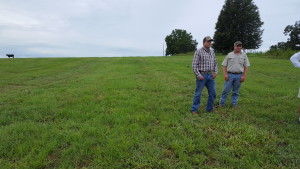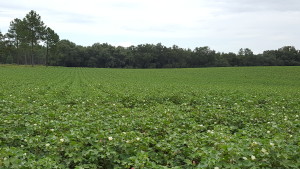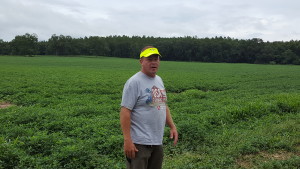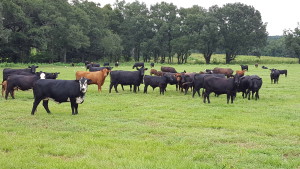The Tri-State Row Crop Climate Learning Network was treated to a tour of several farms in the Monticello area, hosted by UF/IFAS Extension Jefferson County. The tour included a visit to the Fulford Family Farm, where Earnest Fulford is effectively integrating bahaigrass and cattle into his cropping system. Earnest had the opportunity to work with a landowner to develop a win-win situation, with improved pasture grasses for the landlord, and improved crop yields for the crop farmer. Earnest primarily grows cotton and peanuts, with small grains utilized for winter grazing. One of the largest challenges on the farm is steep slopes prone to erosion.

Slopes are large on this farm. This bahiagrass was planted in March 2016 following row crops the past several years. The grass wasmowed to reduce broadleaf weed pressure.
Fortunately the tour group brought along with them 4″ of rain. However one participant called the event, “one inch of rain, and three inches of runoff.” However, Earnest said the crops had only received about 6″ of rain in the previous 90 days, and the benefits of the bahiagrass rotation are evident in the growth of the cotton and peanuts under tough conditions this year.
We visited a field planted to bahiagrass in March, which had lush grass growth and ample grazing for the cattle. The field was recently mowed to reduce broadleaf weeds. Other stops included discussions about techniques, timing, and equipment that Earnest is using to prepare grass fields for planting row crops. This step was the steepest learning curve associated with adoption of this cropping system. After several years of mis-steps, Earnest recently settled on fall applications of glyphosate and triclopyr to terminate grass and broadleaf weeds, then a small grains cover crop was planted following several passes with a vertical tillage implement. Cash crops are planted following winter grazing with the planter mated to a strip-till rig with in-row subsoiling.

Earnest Fulford rotates peanuts and cotton with winter grazing. After several years, this farm is planted back to bahiagrass.
The approach at Fulford Family Farms has been a win-win situation for the crop farmer renting land, and the landowner that would like to keep a low-maintenance cow herd on clean, fertile grass pastures and lush supplemental winter grazing. These techniques have increased the likelihood of success, farming in the challenging climate of the Southeast US along the Gulf Coast.
The Tri-State Climate Row Crop Learning Network is a community focused on strengthening information exchange and learning among farmers, Extension professionals and researchers. This is a dynamic network of climate champions, working to provide information, and develop cropping systems and recommendations for the challenging climate that is found in the Southeast US, especially along the Gulf Coast.


